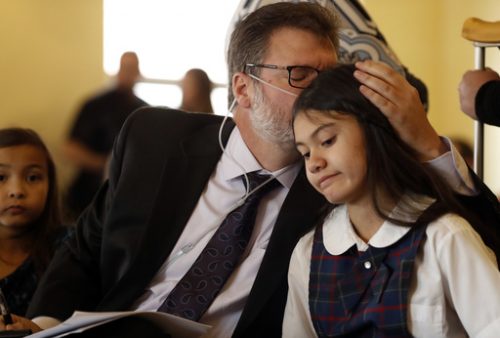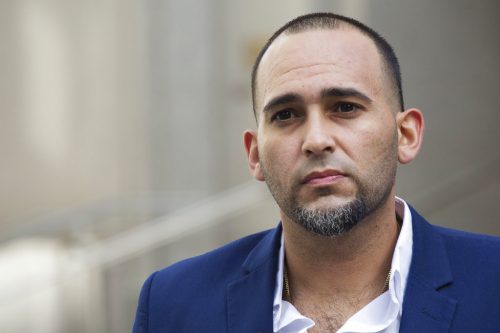A federal judge on Monday dismissed a lawsuit pitting a diverse cadre of cannabis advocates against Attorney General Jeff Sessions and the Drug Enforcement Administration.
The complaint filed in the Southern District of New York last July challenged the constitutionality of the Controlled Substances Act (CSA) as it pertains to marijuana.
The plaintiffs, including an Iraq War veteran, a child with a seizure disorder and an ex-NFL player, claimed that the CSA’s classification of cannabis as a Schedule I substance — a designation reserved for the most dangerous substances including heroin, LSD and mescaline — is so “irrational” that it violates the U.S. Constitution.
In dismissing the case, Judge Alvin K. Hellerstein took pains to “emphasize that this decision is not on the merits of plaintiffs’ claim[s],” attorney Michael S. Hiller said in a statement.
Instead, the judge ruled that that the DEA has authority and before bringing the lawsuit the plaintiffs were required to exhaust administrative remedies including petitioning the DEA to reschedule cannabis.
“Resigning the plaintiffs to the petitioning administrative process is tantamount to a death sentence for those patients who need cannabis to live,” Hiller said in the statement. “The time has come for the courts to abandon decades-old precedent, notched with obsolete legal technicalities, and catch up with modern science and contemporary principles of constitutional law.”
More on Schedule I
New federal bill would reschedule marijuana as Schedule III
American Legion calls on Trump to take cannabis off Schedule I to help vets
How advocates are inspiring members of Congress to champion national CBD oil legalization
‘Something’s going to have to give’: An untenable conflict between feds, legalized states
“The DEA has lost its moral authority”: Rep. Jared Polis pulls no punches in exclusive interview
During Feb. 14 oral arguments in the case, the government claimed that the plaintiffs had not petitioned the DEA to reclassify marijuana.
“When agencies are set up to do the very thing that you want me to do, the right thing to do is defer to the agency,” Hellerstein told Hiller.
During the hearing Hillerstein did show sympathy for the plaintiffs’ claims that medical marijuana has helped them.
“How could anyone say that your clients’ lives have not been saved by marijuana?” Hellerstein said.
The five plaintiffs in the case are a diverse group of cannabis advocates from around the country, the Cannabist previously reported.
Retired NFL defensive end Marvin Washington of Dallas, a long-time cannabis legalization proponent, sued because the CSA makes him ineligible to obtain grants under the Federal Minority Business Enterprise program to start a medical marijuana business.

Alexis Bortell, 11, uses medical cannabis to treat her intractable epilepsy. Her parents — both military veterans — moved their family from Texas to Larkspur, Colo., so that she could access the medicine that her family says drastically improved her seizure condition. She sued because the CSA restricts her ability to travel freely with her medicine and also because the federal illegality of cannabis forbids her from fully accessing the benefits due her as the child of a military veteran.
When he was just 1, Jagger Cotte of DeKalb County, Ga., was put in hospice care, diagnosed with deadly Leigh’s Disease. His parents turned to medical cannabis with hopes of relieving his near constant pain and believe it has extended his life. Now 6, Jagger relies on medical cannabis and, like Alexis, sued because the CSA takes away his right to travel by airplane or travel to or through states in which medical cannabis is illegal.

Jose Balen, 34, of Seminole County, Fla., served in the U.S. Army and was deployed to Iraq for 14 months starting in May 2003. He now uses medical cannabis to treat PTSD, and sued for the right to safely enter a military base, travel by airplane, and travel to states where medical cannabis is illegal.
New York’s Cannabis Cultural Association is a 501(c)3 nonprofit helping marginalized and underrepresented communities engage in the legal cannabis industry; fighting for criminal justice reform; improving access to medical cannabis; and advocating for adult use legalization. In the lawsuit, the group contended that the CSA was enacted and enforced in a discriminatory manner historically targeting populations of color and today prevents them from participating in the legal cannabis industry.
Hiller on Monday vowed to appeal the decision.
“This case will continue to move forward,” he said “Notwithstanding the outcome today, we remain confident that the final disposition of this case will include a finding that the classification of cannabis under the Controlled Substances Act is unconstitutional – freeing millions of Americans to safely treat their conditions with a plant that maintains their health and their lives.”
In a statement, Belen called the ruling disappointing, “but just the beginning.”
“We are on the right side of history, and we will take this fight to the Supreme Court if necessary,” he said.
The Associated Press contributed to this report
Read Washington, et.al v. Sessions, et.al
